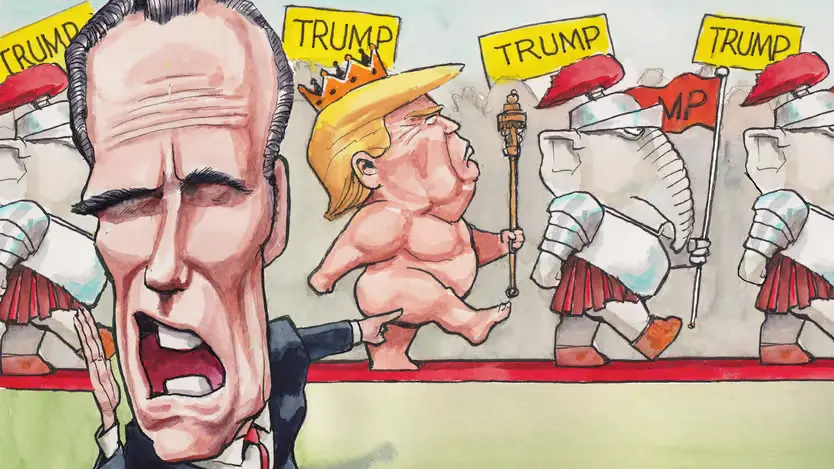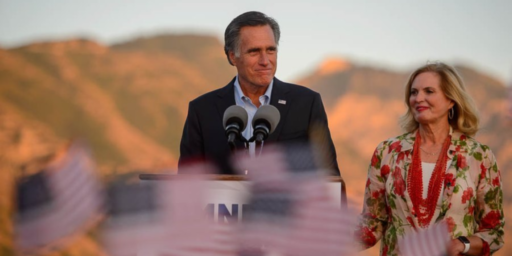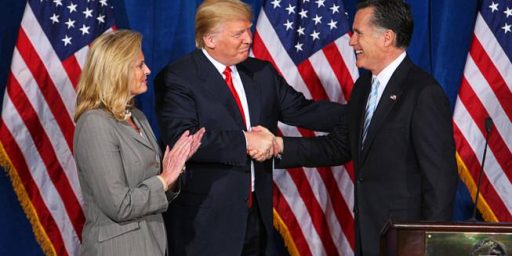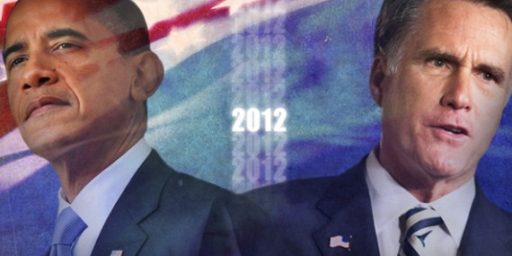Romney and the Decline of the GOP
The party's 2012 nominee is an indicator of how fall it has fallen.

The Economist‘s Lexington columnist, James Bennet, argues that “Mitt Romney is the fixed point revealing the Republicans’ slide.” The setup:
So a politician in the evening of his career, with a vast family, a rich spiritual life and great wealth to fall back upon, summoned the nerve to declare what his peers muttered privately: that a man who was obviously unfit to be president was, in fact, unfit to be president. Does the courage of Mitt Romney in standing up to Donald Trump really say something wonderful about Mr Romney, or just something dismal about American democracy?
The grim answer is that it does say something good about Mr Romney precisely because it illuminates how debased the leadership of the Republican Party has become. Only against the shadow of dire compromise and cowardice could Mr Romney’s sense and decency gleam so brightly.
This is clearly a case where both things are true. Romney, like his father, has shown courage in denouncing extremism in his own party. And, yes, the fact that Romney was the Republican nominee in 2012 and was essentially an apostate one cycle later says a lot about the party. Sadly, that he mostly hid his worse critiques in his diary until now shows that what passes for courage in American politics these days is thin.
Not that American politics looked so great even before Mr Trump ran for president in 2016. As McKay Coppins writes in a new biography, “Romney: A Reckoning,” Mr Romney made compromises of his own to run for office, including to become the Republican nominee for president in 2012. He was also subject to the kind of hysterical demonisation that has long been standard partisan practice: Joe Biden, then the vice-president, warned a mostly black crowd in 2012 that Mr Romney and his banker allies wanted to “put ya’ll back in chains”. Maybe politicians of both parties cried wolf for so long that they—and thus voters—failed to recognise him when he appeared at the door.
As Bill Clinton has pointed out time and again, the nature of American politics is to highlight, even exaggerate, the differences between candidates. The notion that Mitt Romney, of all people, wanted to put Black people in chains was a damnable lie and, as many of us have noted since, had a”Boy Who Cried Wolf” quality that made it harder to effectively denounce the true extremism of Trump and the MAGA wing. Cry “Racist!” often enough and it loses its sting.
But it’s also true that Romney, like John McCain the cycle before, chose to debase himself to appeal to an increasingly radical base. I don’t know that Barack Obama was beatable in 2012 but a neutered Romney had no chance.
In 2012 Mr Romney welcomed Mr Trump’s endorsement. Yet back then Mr Romney, like many who knew Mr Trump, considered him outrageous but harmless and therefore charming. “This guy is not fake—he says 100% of what he thinks,” Mr Coppins quotes Mr Romney writing in his journal. “Got to love him. Makes me laugh and makes me feel good, both.” The feeling curdled as Mr Trump emerged as a viable candidate in 2015. The Republicans’ swing in four years to Mr Trump from Mr Romney seems neck-snapping even now; it was a kind of penance in reverse, a brawling, bankrupting bender in a strip club after a quiet morning in the pews. Mr Romney was offended by Mr Trump’s policies, but he was more alarmed by his character, seeing him, in Mr Coppins’s words, as “a profoundly depraved and broken person”.
In fairness to Romney, the 2012 Trump was a clown whose political pronouncements were easy to laugh off. It quickly became apparent during his run for the 2016 nomination that he was the Joker, capable of doing real harm.
Mr Romney considered getting into the race himself, then tried to engineer an anti-Trump unity ticket. In February 2016 he gave a speech calling Mr Trump “a phoney, a fraud” who was playing Americans “for suckers”. When Chris Christie, the former governor of New Jersey, dropped out and endorsed Mr Trump, Mr Romney harangued Mr Christie to withdraw the endorsement, saying it “severely diminishes you morally”.
In 2017 Mr Romney, in his management consultant’s style, kept a list on his iPad of the pros and cons of possibly running for the Senate from Utah. At the top, he quoted W.B. Yeats: “The best lack all conviction, while the worst/Are full of passionate intensity.” Those lines, he felt, captured “the new gop”. Once he ran and won, Mr Romney was astonished by what he learned about Republican senators: “Almost without exception they shared my view of the president,” he tells Mr Coppins. Once, after Mr Trump addressed the senators and then left the room, “the Republican caucus burst into laughter”. His colleagues would tell Mr Romney they wished they had secure enough constituencies back home to be able to speak up as he did. The majority leader, Mitch McConnell, referred to Mr Trump as “an idiot” and told Mr Romney he was lucky because “you can say the things that we all think”. Mr Romney developed a stock response: “There are worse things than losing an election. Take it from somebody who knows.”
While I naturally agree and have said the same thing more times than I can count, it’s much easier to take that stance if you’re a mega-millionaire or a professor-pundit with no political power. If McConnell or other Republican Senators lose power, they go from Somebody to Nobody really fast. Upton Sinclair famously remarked, “It is difficult to get a man to understand something when his salary depends on his not understanding it.” It’s similarly difficult to get a man to do something when his status depends on his not doing it.
The book’s emotional high point is its account of the agonised process by which Mr Romney decided to vote to convict Mr Trump after his first impeachment, for abuse of power in conditioning aid to Ukraine on its announcing an investigation of Mr Biden. Mr Romney’s journal reveals his contempt for Republican legislators’ indifference to their constitutional duty—even Mr McConnell suggests he thinks Mr Trump is guilty—and his growing isolation as they lobby and even attack him. “Sad to see what happens to people when they want to win at any cost,” Mr Romney writes.
In the second impeachment trial, after the attack of January 6th, Republicans added a chilling new rationale for not voting to convict: too many Trump supporters had guns. Mr Romney was sympathetic to this fear, since by then he was paying $5,000 a day for security to protect his own family.
That’s sad all around. One could argue, though, that these fears should have had the opposite effect of screwing up the courage to speak out against that rising authoritarian tide.
Mr Romney not only handed over his journals, texts and emails to Mr Coppins but also sat for more than 45 interviews over more than two years. Although the leftish press has celebrated Mr Romney’s catty put-downs of fellow Republicans, the book’s more satisfying revelations, of which there are many, form a portrait of Mr Romney as an introspective, vulnerable, even self-lacerating person, ambitious for himself but also to do the right thing.
Mr Coppins frames his biography around Mr Romney’s own compromises, regarding them as moral lapses and asking if they empowered Mr Trump (that’s the “reckoning”). This seems unfair to Mr Romney and, for students of politics, a bit of a dead end. After all, in politics, compromise—even of principles—can be a good thing. To witness the chaos created by its absence one need look no further than the House Republican caucus. The trick is to know when to compromise and how far to go. Mr Romney, who at 76 has decided not to run again for his seat, seems to have got far more such calls right than wrong.
The first line of his obituary—an obsession for Mr Romney—seems less likely to record that he lost a presidential election than that he was the first senator to vote to convict a president of his own party. Whether history will ultimately judge that to have been the act of a hero or a turncoat, of course, is something American politics has yet to determine.
Given who writes histories, he’ll certainly not be seen as a turncoat. But, I suspect, also not that much of a hero.
We saw this of him in 2012. He’s fundamentally a decent man who wants to do the right thing and an ambitious man willing to twist himself to the prevailing winds. Unlike some more successful politicians, he lacks the shamelessness to hide that inner conflict.
Compared to his Republican colleagues, he did the right thing more often than the rest. Alas, that’s a very low bar.






“Compared to his Republican colleagues, he did the right thing more often than the rest. Alas, that’s a very low bar.”
Indeed. The last few weeks have shown that not merely is supporting an insurrection no bar for a Republican to assume a leadership position, but not supporting an insurrection is fatal to one’s chances (see Tom Emmer).
I’m having trouble wrapping my head around this statement: “He’s fundamentally a decent man who wants to do the right thing” with the fact that when he was in private equity he made his money by (legally) stealing the pensions of the workers at the companies he took over. Also, when you give even the slightest thought to his 47% speech, you understand that he puts people on social security and medicare in the “parasite” category. In this book he just published he agonizes over saying this out loud and what it cost him, but according to those who have read it there is nothing in there indicating he changed his mind. Bottom line, he is nothing like his father. He is a smug, self centered child of privilege who looks down on anyone who doesn’t have his advantages. And yes, he is the best that the Republican Party has to offer to do. That’s a very sad state of affairs.
C’mon James, it was a turn of phrase, not to be taken literally.
And ftr, society has long turned it’s back on how some of our wealthier citizens put the poor in chains of debt.
Well, Sarah Palin said “Don’t Retreat, Reload!” and used crosshairs. Was that a turn of phrase, not to be taken literally? What about “Lock Her Up”? I mean, she didn’t get locked up, right?
@MarkedMan:
James Joyner can’t admit any of that because then he has to acknowledge that Trump isn’t some natural disaster that came out of nowhere. If James Joyner has to admit that it was people like Romney and McConnell and James Joyner who summoned up Donald Trump and put him in the White House, his whole smug sense of self would collapse.
@TheRyGuy: James has a different opinion about Romney than me, and he is as entitled to that opinion as I am to mine. I stated my case more for the record than to try to convince him he is wrong. I sure as hell don’t see the need to insult him because we disagree, just as (reading his mind here) he doesn’t see the need to insult me either.
@TheRyGuy: @MarkedMan: While I don’t think Trump came out of the blue—there are seeds in Pat Buchanan, Newt Gingrich, and especially the Tea Party—I do think he was a pretty stark break from the nominees of my lifetime. (Barry Goldwater was in some very different ways an extremist but predates me.) And, for Romney in particular, I think the guy he was a Governor of Massachusetts is closer to who he really is than the guy who had to navigate the 2012 GOP primaries.
@TheRyGuy: Hey, yesterday you were a MAGAt, today you’re a lefty! A refreshing, almost post-modern approach to trolling!
Romney couldn’t run away from MassCare, a decent program he helped get started, fast enough when he thought it could impair his Presidential chances..
Lessons in character.
Also, remember this? “Scott Prouty came forward to say he secretly taped the video last year in which GOP presidential nominee Mitt Romney told donors that 47% of Americans are “dependent on the government” and “believe they are victims.”
@Argon: I was, and still am, amazed he got away with campaigning against Obamacare while eliding Romneycare. Also, too, he visited London and pretended his wife and her horse weren’t just down the road at the Olympics. I guess he thought a dancing horse unmanly.
Republican keep saying character matters. That’s true, but they seem to be awfully bad judges of character.
@MarkedMan:
Me, too. 🙁 I also struggle with Coppins’ observation that
while I remember that in the speech he made criticizing Trump, he objected only to Trump’s vulgarity but supported Trump’s “accomplishments.” The fact that Romney shows up as a bright spot in the GQP firmament is a comment more on how dismal and dark that firmament is than that “Romney’s sense and decency gleam.”
@wr: I was going to comment on RyGuy’s comment, but your observation is so spot on that I see no reason to. 😉 [thumbs up emoji]
A blast from the past. Back in 2016 Steve Benen started listing Romney’s lies each week.
Alas no. In 46 weekly installments Benen got to 917 lies. Impressive at the time, but nothing compared to the 30,000 WAPO counted from Trump over four years. But a significant stepping stone. Post-truth indeed.
Various folks are pointing out, quite reasonably, that Romney was not their cup of tea as a businessman or a politician.
Well, yes: he’s a venture capitalist aligned Republican, not a Democrat.
The point is, at least he remained within the parameters of normal constitutional politics.
It’s similar to the UK Conservatives. A lot of those Tories who have criticized Johnson and Truss, eg former Chancellor George Osborne, were responsible for the “austerity” policies and insouciance regarding the UK industrial base, which have had dire effects on both economic resilience and social deprivation.
But at least they did not play fast-and-loose with the UK constitution re Parliamentary privilege, prorogation, judicial review and the Northern Ireland settlement.
And even the sins of the ERG/Johnson-ites/Truss gang were mild compared to attempting to undermine the basic democratic process of a presidential election.
In short:
Be grateful for an opponent who is willing to accept the legal and procedural norms of democratic governance.
The alternative is a lot worse.
No snowflake thinks itself responsible for the avalanche. Individualism here means NOTHING because it’s the aggregated force that causes the death and destruction. Who cares about the individual movements of a snowflake and if it’s descent is less ballistic then it’s neighbors? Not the people in its path, that’s for sure.
A snowflake that falls during one still contributes. Showing up when the destruction has started is just piling on. Being around is contributing. You cannot be a snowflake in an avalanche and be innocent as your mere presence makes a dangerous situation potentially worse. Snow falls together, after all – you are part of the group and responsible for its actions, like it or not.
A snowflake that manages to not hit or destroy something is still part of the destructive wave. It doesn’t get to brag it didn’t kill anyone nor break anything with pride. How insane it is to praise a single snowflake for being less messed up then it’s peers during a crisis? Oh, you only fell and added to the weight 20ft that way? Still part of the problem!!
Change snowflake with GOP and that’s what this sounds like. He wants praise for failing to be a decent human being, only a less crappy conservative and less nuts then his batsh^t companions. He “doesn’t want to do the right thing” or he would have been doing more louder. He’s certainly ambitious and pretentious but a decent man? Everyone thinks they’re decent as no one thinks themselves the villain of the story. Being less rotten down through your soul still means you’re rotten, something someone of faith like Romney should get on a spiritual level.
Meh. The Republican Party, including Mitt Romney, has fed the wolves by catering to, coddling, and elevating anti-blackness, vote suppression, and white supremacists for fifty years. They/we were repeatedly warned to stop.
Enablers of racism and extremism are not innocents. We should not be so outraged when painted with the same brush as our chosen friends.
@JohnSF:
One does not applaud the tenor for clearing his throat. You don’t get kudos for the basic minimum of what you’re supposed to do. I don’t think politicians deserve any plaudits for the basics of upholding rule of law.
Homicide is a worse crime than physical assault. That does not mean the batterer deserves “gratitude” for leaving the victim alive.
Romney’s okay. He doesn’t deserve any extra special feeling.
@DK: Well, “plaudits” or not, since there is a sizeable number of people in the US who don’t seem to give a fig about rule of law, I think we need to articulate the principles that we find important, and point at people who follow them.
Rule of law is one of those really important fundamentals. I have the worst time convincing, well, anybody much of that. But I’m gonna keep standing up for it.
I mean saying someone isn’t an insurrectionist and supports majority rule and the democratic process – that may or may not be plaudits, but right now, it’s kind of important information.
To put it in extreme terms, whether a politician disagrees with me on how high taxes should be or how to best spend our money is in a very different category than those who say the election was stolen, and the nation should be ruled by God’s Will, not voting. Right?
In an entirely different sphere, I have been known to speak up positively on fatherhood, and the benefits of changing diapers (not that there isn’t a down side). I got some pushback of the nature of “men don’t deserve praise for this, they just should be doing it”
Which I find to be not very cognizant of how social change happens. In order to change, people have to see the proposed change and consider whether they want that difference. Bearing witness is important.
@JohnSF: My sense of the conversation is that it has been a picture of “Compared to his Republican colleagues, he did the right thing more often than the rest. Alas, that’s a very low bar” looks like.
@DK:
Yeah, what you said. They made a fateful decision to go after the Wallace voters in ’68. It’s been the official White party since then, and I don’t have a lot of patience with Republicans who are shocked, shocked by Trump or people with Tiki Torches. They knew what Willie Horton was about, because liberals told them, but they never backed off that. They chose, knowingly, to ride the tiger, and now they’re inside the tiger pretending to be surprised.
@Michael Reynolds:
Exactly this. When I was voting Republican, I knew who I was getting in bed with. We all knew. It’s not a pretty thing. Republicans made a Faustian bargian, and we had our reasons. Okay fine, but let’s not pretend that those who were calling us out all along didn’t have a point.
Republicans were and are actively complicit in promoting racism and protecting racists, so this whole “Omg how can you think these terrible things about me” act…please. Come on.
@Just nutha ignint cracker:
The bar is so low, a microscopic flatworm struggles to limbo under it.
@Jay L Gischer:
Except when it isn’t. Gandhi is on the phone; he’d like a word with you.
Oh, FFS. Mitch McConnell, despite spending his entire life in public service (where his yearly compensation has been far south of $200K), has amassed a net worth of over $35M. Maybe that’s not a “mega”-millionaire, but the idea that his wealth and well-being depends on him being a senator is the most nonsensical of nonsense.
And why is it never questioned how these lifelong politicians amass this vast wealth *without never leaving office?* They are as bad as those corrupt African dictators.
And, before someone both-sides this, it is demonstrably much worse on the (banana) Republican side. “But, but, what about Biden?” I can hear the whiny screechers of the Republican whatabouters already. He made his cash after he left office, which is still a bit dubious (to be able to cash in like that) but nothing like the McConnells of the world.
@DrDaveT: It seems to me that Ghandi’s program for addressing unjust laws shows respect for rule of law. Just like lying, as opposed to bullshit, shows respect for truth. It appears to have elements in common with Trudeau’s Civil Disobedience, which also seems to me to respect rule of law.
If memory serves, Ghandi was himself a lawyer.
In another, more immediate, example: the policy in Texas for investigating gender-affirming-care as child abuse.
I would dearly love to live in Texas in a situation where I could publicly demand that the State try to prosecute me for child abuse. I would flout that law loudly and obnoxiously. I would DARE them to prosecute me – because A) I think it’s unjust, and it would give me a platform to say so, and B) I don’t think it can hold up in court.
This is not disrespect of the rule of law, it’s quite the opposite.